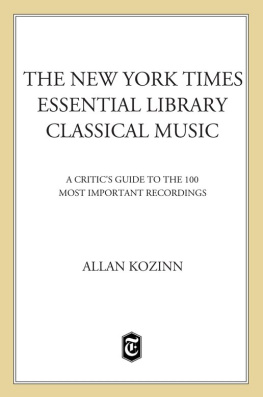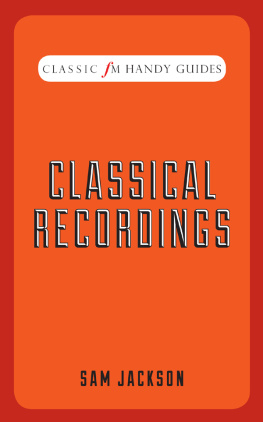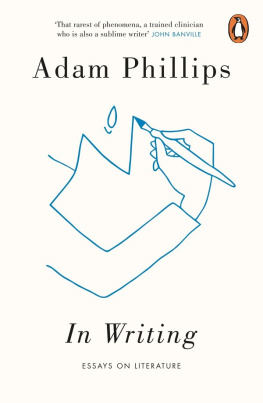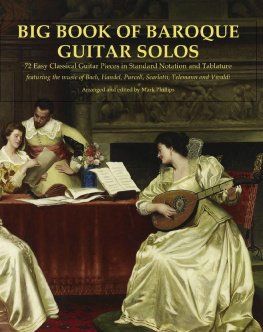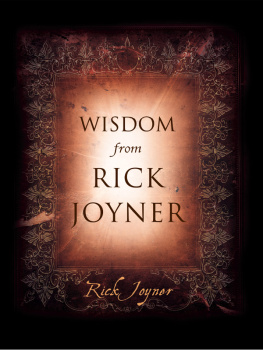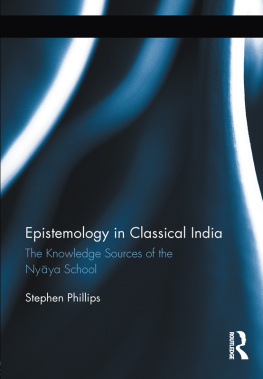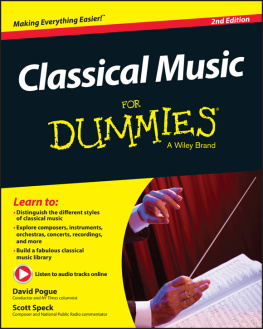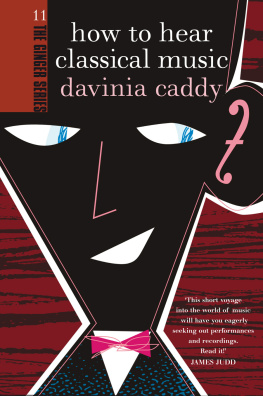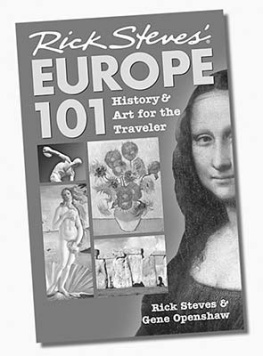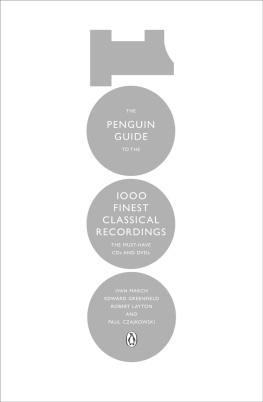Rick Phillips - The Essential Classical Recordings - 101 CDs
Here you can read online Rick Phillips - The Essential Classical Recordings - 101 CDs full text of the book (entire story) in english for free. Download pdf and epub, get meaning, cover and reviews about this ebook. year: 2004, publisher: McClelland&Stewart, genre: Detective and thriller. Description of the work, (preface) as well as reviews are available. Best literature library LitArk.com created for fans of good reading and offers a wide selection of genres:
Romance novel
Science fiction
Adventure
Detective
Science
History
Home and family
Prose
Art
Politics
Computer
Non-fiction
Religion
Business
Children
Humor
Choose a favorite category and find really read worthwhile books. Enjoy immersion in the world of imagination, feel the emotions of the characters or learn something new for yourself, make an fascinating discovery.

- Book:The Essential Classical Recordings - 101 CDs
- Author:
- Publisher:McClelland&Stewart
- Genre:
- Year:2004
- Rating:5 / 5
- Favourites:Add to favourites
- Your mark:
- 100
- 1
- 2
- 3
- 4
- 5
The Essential Classical Recordings - 101 CDs: summary, description and annotation
We offer to read an annotation, description, summary or preface (depends on what the author of the book "The Essential Classical Recordings - 101 CDs" wrote himself). If you haven't found the necessary information about the book — write in the comments, we will try to find it.
The Essential Classical Recordings - 101 CDs — read online for free the complete book (whole text) full work
Below is the text of the book, divided by pages. System saving the place of the last page read, allows you to conveniently read the book "The Essential Classical Recordings - 101 CDs" online for free, without having to search again every time where you left off. Put a bookmark, and you can go to the page where you finished reading at any time.
Font size:
Interval:
Bookmark:
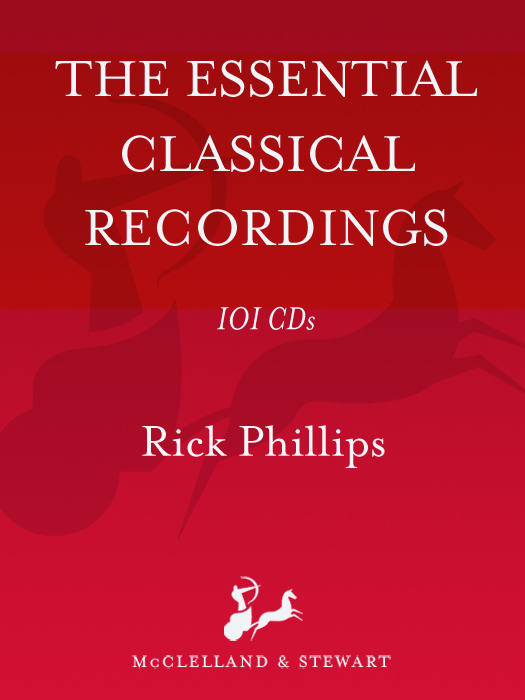
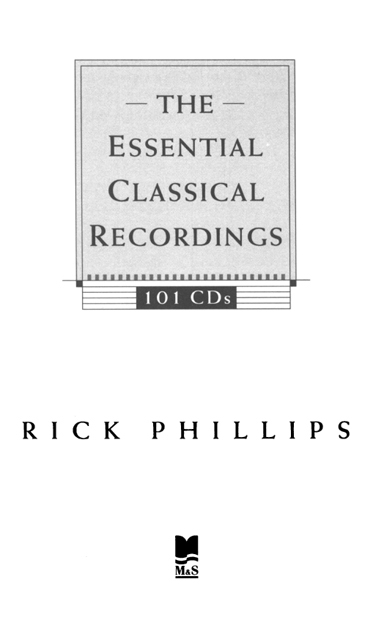
Copyright 2004 by Rick Phillips
All rights reserved. The use of any part of this publication reproduced, transmitted in any form or by any means, electronic, mechanical, photocopying, recording, or otherwise, or stored in a retrieval system, without the prior written consent of the publisher or, in case of photocopying or other reprographic copying, a licence from the Canadian Copyright Licensing Agency is an infringement of the copyright law.
Library and Archives Canada Cataloguing in Publication
Phillips, Rick
The essential classical recordings : 101 CDs / Rick Phillips.
eISBN: 978-1-55199-521-2
1. MusicDiscography. 2. Compact discsReviews. I. Title.
ML156.9.P562 2004 780.266 C2004-903239-9
We acknowledge the financial support of the Government of Canada through the Book Publishing Industry Development Program and that of the Government of Ontario through the Ontario Media Development Corporations Ontario Book Initiative. We further acknowledge the support of the Canada Council for the Arts and the Ontario Arts Council for our publishing program.
The lines on are taken from the poem Strange Meeting by Wilfred Owen, from The Collected Poems of Wilfred Owen, copyright 1963 by Chatto & Windus, Ltd.
Reprinted by permission of New Directions Publishing Corp.
McClelland & Stewart Ltd.
The Canadian Publishers
75 Sherbourne Street
Toronto, Ontario
M 5 A 2 P 9
www.mcclelland.com
v3.1
To Hat who started it all,
and to Diane for love, support, and encouragement.



I n the early seventeenth century, the English religious scholar Thomas Draxe said, Music is the eye of the ear. The link to sight or the visual has been something music has wrestled with for generations. Today we tend to use our hearing as a way of confirming our sight, so Draxes claim could easily be turned around to read, Music is the ear of the eye. Manufactured images today are everywhere, in films, on television and computer screens, on billboards, and in the print media. We are now very visually oriented, relying on our sight to learn, experience, and entertain, and on our hearing to enhance what we see.
Since the development of radio and the gramophone in the twentieth century, music has lost ground to the visual in its power to arrest our attention. Music is in our homes and offices, and is as easily accessible as turning on the tap or the light switch. Its in elevators, dentists offices, and shopping malls. Workers in factories often have music piped in to accompany their labours, but the music cant be too good, because then it can be distracting, and production targets fall. This ease of accessibility has caused us to take music for granted. We hear music constantly today, but we dont listen to it. Its used to fill a void, or a perceived void.
Yet music can still draw pictures and images for us. The great German Romantic writer Goethe is reported to have described architecture as frozen music. Its a powerful language that can communicate concepts and ideas non-visually and non-verbally, and it can also convey deep emotion and feeling.
This book is intended as a guide for both those who are just starting to explore the rich world of classical music and those who already have a serious CD collection but want to explore other performances. It is, above all, for those who want to expand their aural senses and awareness who want to increase their understanding and enjoyment of the highly useful and expressive language of music. All forms of music are valid and worthy, from folk songs to pop, jazz, rock, and hip hop. They can all express ideas and emotions. But this book deals with classical music the age-old form that has experienced many rises and falls over hundreds of years, and still manages to survive. How we use music is up to each individual, but this book deals with music that was intended to be listened to, not just heard foreground listening, not background.
Today, we hear about the demise of the compact disc the format of recorded music thats been with us now for almost thirty years. Downloads, MP3s, and soundfiles are the way of the future, but, as always, the medium is not as important as the music. Regardless of how we access it, its the music itself that will survive. Many of the classical music recordings recommended in this book are classic, and will always be available in one format or another. Record companies are always reissuing recordings. Every few years, they remaster the original tapes using the latest technology, repackage them with new art, graphics, and jacket notes, and re-release them. As a result, the serial numbers of the recordings can change. But the music, artists, ensembles, and conductors remain the same, and usually the record label, so thats what to look for. And remember that any list produced is obsolete the minute its printed. New recordings of classical music are always coming out, but the recommendations in this book are recordings that I think have a lasting shelf life.
Although there are 101 recommended recordings, you do not have to acquire all of them to truly enjoy classical music. Used as a guide, the book can steer you to furthering your own personal musical tastes. I hope that it will also expose you to new insights and ideas about music, encouraging you to listen to music that you might not have thought you would ever enjoy. If youre like me, youve sometimes been surprised at how your musical tastes have developed and changed over time, and how youre fond of music now that you wouldve never dreamed of liking a decade ago.
Ive attempted to supply an overview of classical music, ranging from the Middle Ages and before, to the present day. For the purposes of this book, the Middle Ages lead into the Renaissance, or the fifteenth and sixteenth centuries in music. The Baroque period is roughly 1600 to 1750. The Classical period of music runs from about 1750 to 1820 or so, overlapping with the nineteenth-century Romantic Age, and leading on into the modern age of the twentieth and twenty-first centuries.
Ive avoided musical jargon and theoretical terms, and I dont think that its necessary to be able to read music or understand musical theory or structure to enjoy classical music. They can enhance your appreciation, theres no question. But really, just an interest and an open mind are the first requirements to a life of musical enjoyment. Music is a non-verbal language. It shouldnt intimidate or scare anyone.
Many genres of music are here from vocal and choral, to orchestral, chamber music, solo instrumental, and ballet. Ive also tried to include a range of nationalities not only of the composers, but also in the artists and ensembles selected. By no means is this a tally of the best 101 works or recordings. Any such list would be fruitless, given the subjectivity of art and music. It is simply an overview of classical music and recordings, and I dont make any claim that my selection is right or definitive, or even better than any other. But, over twenty-five years in the classical music business, as a writer, broadcaster, and teacher, Ive been following what has been recorded and released, and its worth.
Font size:
Interval:
Bookmark:
Similar books «The Essential Classical Recordings - 101 CDs»
Look at similar books to The Essential Classical Recordings - 101 CDs. We have selected literature similar in name and meaning in the hope of providing readers with more options to find new, interesting, not yet read works.
Discussion, reviews of the book The Essential Classical Recordings - 101 CDs and just readers' own opinions. Leave your comments, write what you think about the work, its meaning or the main characters. Specify what exactly you liked and what you didn't like, and why you think so.

